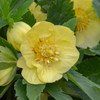

Please note your preferred ship date/week in the "Order Comments" section at checkout.
Otherwise, please allow 1-3 weeks to receive your order.
See the "Shipping" page under "Company Information" for our default ship dates based on hardiness zone.
We are unable to ship to any US Territories, AK, AZ, CA, CO, HI, ID, MT, NM, NV, OR, UT, WA, or WY
This evergreen perennial with thick leaves, blooms early, vigorous and is easy to grow.
Tolerant to black walnuts and is long-lived, tough and a somewhat ground-covering perennial.
Blooming Time: February/March to April/May (depending on your zone).
Size: 18-24" tall and wide, and in time forms wider clumps
USDA Zones: 4 to 9
Culture: Half shade, dappled sun, dappled shade to full shade, virtually any soil that is not waterlogged
Moisture Needs: medium-moist to medium-dry
Origin: selected by plant hybridizer Hans Hansen at Walters Gardens. Part of the HONEYMOON® Series.
Black Walnut Tolerant: yes
Deer/Rabbit Resistant: yes / yes
Attracts Butterflies or Pollinators: honey bees, possibly some native bees and flies
Attracts Hummingbirds: no
Pot Size: square 3.5" x 5" deep pot
Plant combinations : Best in half shade, dappled shade, woodland edge gardens, shade gardens, underplanting shrubs and trees. Meets in bloom and goes well with many spring bulbs and spring ephmerals. Looks well with fine structures like grassy leaves - Carex (sedges), Hakonechloa, narrow-leaved Hosta, Iris cristata (and the Asian counterparts) or Tradescantia and also fine leaves of ferns!
Good companions can be also shorter cultivars of Amsonia, smaller Alchemilla, Anemone hupehensis (japonica), Aquilegia, Asarum, woodland Aster (Aster divaricatus etc.), Brunnera, Chelone lyonii, Dicentra, Disporum, Epimedium, Gallium odoratum, most of common hardy Geraniums, Helleborus, Heuchera and Heucherella, Geum, Lysimachia, Mellittis, Mukdenia, Nepeta subsessillis, Penstemon digitalis and calycosus (and hybrids), Phlox (x carolina and interspecific hybrids, Phlox divaricata, Phlox stolonifera, Phlox bifida), Podophyllum, Polemonium, Polygonatum, Primula, Pulmonaria, Sedum ternatum, Stachys officinalis hybrids, Stylophorum, Tiarella, Tricyrtis, Uvularia, Viola or Waldsteinia.
Picture copyright : Walters Gardens
This evergreen perennial with thick leaves, blooms early, vigorous and is easy to grow.
Tolerant to black walnuts and is long-lived, tough and a somewhat ground-covering perennial.
Blooming Time: February/March to April/May (depending on your zone).
Size: 18-24" tall and wide, and in time forms wider clumps
USDA Zones: 4 to 9
Culture: Half shade, dappled sun, dappled shade to full shade, virtually any soil that is not waterlogged
Moisture Needs: medium-moist to medium-dry
Origin: selected by plant hybridizer Hans Hansen at Walters Gardens. Part of the HONEYMOON® Series.
Black Walnut Tolerant: yes
Deer/Rabbit Resistant: yes / yes
Attracts Butterflies or Pollinators: honey bees, possibly some native bees and flies
Attracts Hummingbirds: no
Pot Size: square 3.5" x 5" deep pot
Plant combinations : Best in half shade, dappled shade, woodland edge gardens, shade gardens, underplanting shrubs and trees. Meets in bloom and goes well with many spring bulbs and spring ephmerals. Looks well with fine structures like grassy leaves - Carex (sedges), Hakonechloa, narrow-leaved Hosta, Iris cristata (and the Asian counterparts) or Tradescantia and also fine leaves of ferns!
Good companions can be also shorter cultivars of Amsonia, smaller Alchemilla, Anemone hupehensis (japonica), Aquilegia, Asarum, woodland Aster (Aster divaricatus etc.), Brunnera, Chelone lyonii, Dicentra, Disporum, Epimedium, Gallium odoratum, most of common hardy Geraniums, Helleborus, Heuchera and Heucherella, Geum, Lysimachia, Mellittis, Mukdenia, Nepeta subsessillis, Penstemon digitalis and calycosus (and hybrids), Phlox (x carolina and interspecific hybrids, Phlox divaricata, Phlox stolonifera, Phlox bifida), Podophyllum, Polemonium, Polygonatum, Primula, Pulmonaria, Sedum ternatum, Stachys officinalis hybrids, Stylophorum, Tiarella, Tricyrtis, Uvularia, Viola or Waldsteinia.
Picture copyright : Walters Gardens
